Public International Law Assignment: Is International Law a Law?
VerifiedAdded on 2022/08/31
|9
|1926
|39
Essay
AI Summary
This essay critically evaluates the question of whether international law qualifies as a true legal system, referencing the views of John Bolton, Anthony D’Amato, and Anthea Roberts. The essay begins by acknowledging the debate surrounding international law's non-codified nature and its legitimacy in the global context. It then defines law and explores the sources of international law, including treaties, customs, and general principles, as well as its role in regulating state behavior and promoting international relations. The essay discusses various theories and viewpoints, including those of John Bolton, who questions the uniform acceptance of international law's sources. It also examines the perspectives of legal philosophers like Neil MacCormick and John Austin, as well as those of British lawyers James Brierly, Gerald Fitzmaurice, and Hersch Lauterpacht. Professor Anthony D'Amato's concept of reciprocal-entitlement violation and Professor Anthea Roberts' concepts of difference, dominance, and disruption are analyzed. The essay concludes by summarizing the arguments and suggesting that, while international law significantly impacts global politics, its status as a full-fledged law remains controversial due to the lack of uniformity in its sources.
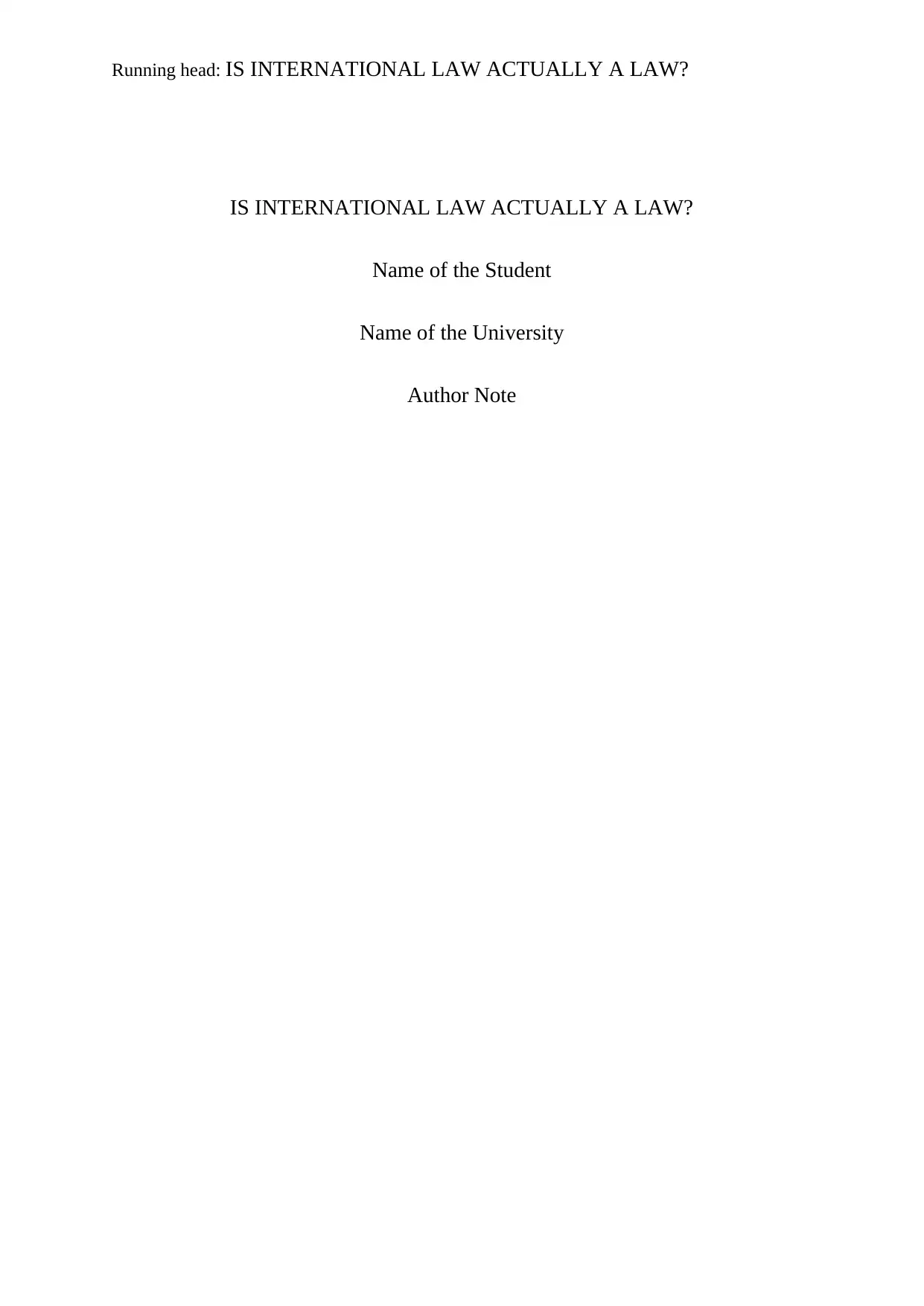
Running head: IS INTERNATIONAL LAW ACTUALLY A LAW?
IS INTERNATIONAL LAW ACTUALLY A LAW?
Name of the Student
Name of the University
Author Note
IS INTERNATIONAL LAW ACTUALLY A LAW?
Name of the Student
Name of the University
Author Note
Paraphrase This Document
Need a fresh take? Get an instant paraphrase of this document with our AI Paraphraser
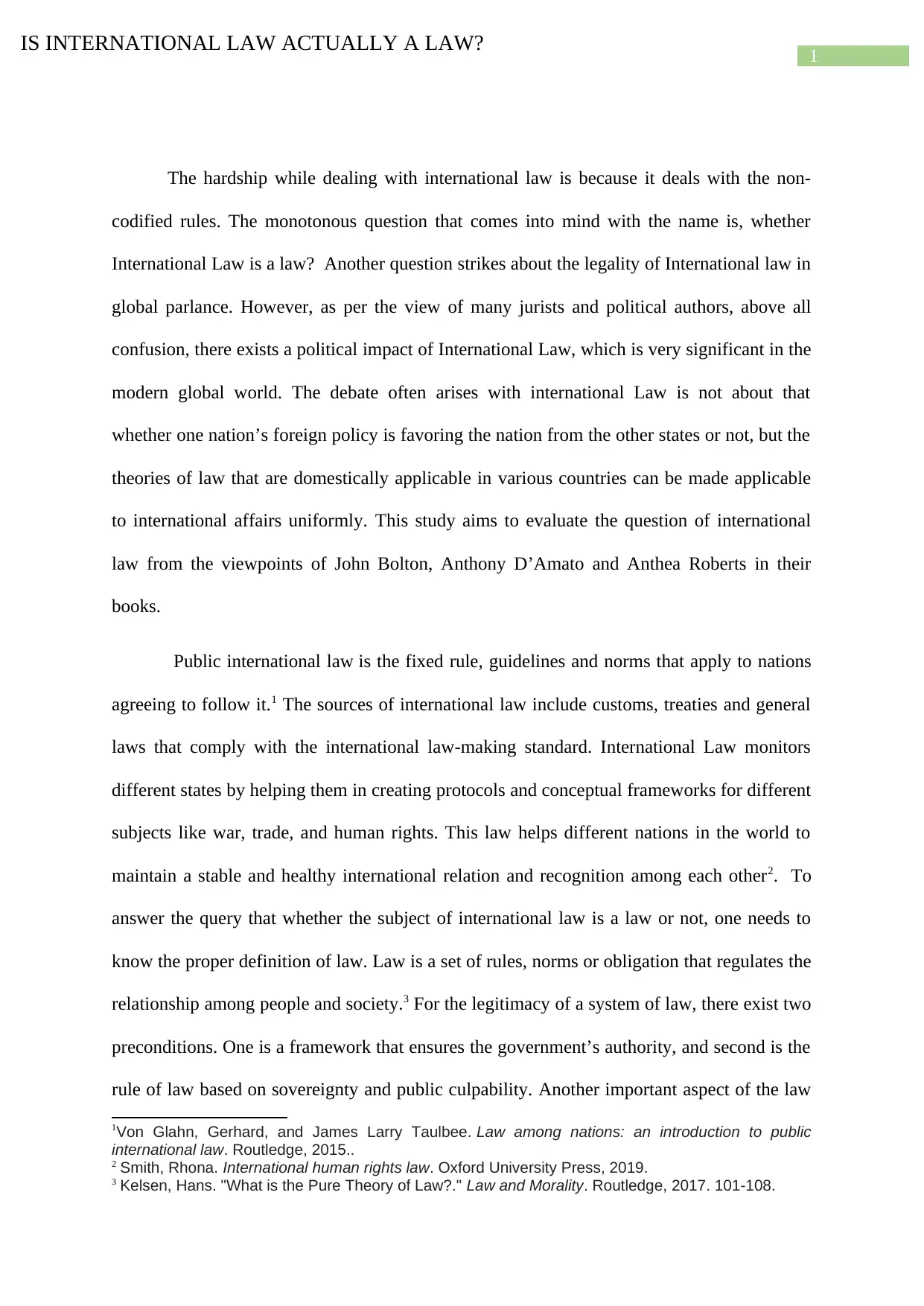
1
IS INTERNATIONAL LAW ACTUALLY A LAW?
The hardship while dealing with international law is because it deals with the non-
codified rules. The monotonous question that comes into mind with the name is, whether
International Law is a law? Another question strikes about the legality of International law in
global parlance. However, as per the view of many jurists and political authors, above all
confusion, there exists a political impact of International Law, which is very significant in the
modern global world. The debate often arises with international Law is not about that
whether one nation’s foreign policy is favoring the nation from the other states or not, but the
theories of law that are domestically applicable in various countries can be made applicable
to international affairs uniformly. This study aims to evaluate the question of international
law from the viewpoints of John Bolton, Anthony D’Amato and Anthea Roberts in their
books.
Public international law is the fixed rule, guidelines and norms that apply to nations
agreeing to follow it.1 The sources of international law include customs, treaties and general
laws that comply with the international law-making standard. International Law monitors
different states by helping them in creating protocols and conceptual frameworks for different
subjects like war, trade, and human rights. This law helps different nations in the world to
maintain a stable and healthy international relation and recognition among each other2. To
answer the query that whether the subject of international law is a law or not, one needs to
know the proper definition of law. Law is a set of rules, norms or obligation that regulates the
relationship among people and society.3 For the legitimacy of a system of law, there exist two
preconditions. One is a framework that ensures the government’s authority, and second is the
rule of law based on sovereignty and public culpability. Another important aspect of the law
1Von Glahn, Gerhard, and James Larry Taulbee. Law among nations: an introduction to public
international law. Routledge, 2015..
2 Smith, Rhona. International human rights law. Oxford University Press, 2019.
3 Kelsen, Hans. "What is the Pure Theory of Law?." Law and Morality. Routledge, 2017. 101-108.
IS INTERNATIONAL LAW ACTUALLY A LAW?
The hardship while dealing with international law is because it deals with the non-
codified rules. The monotonous question that comes into mind with the name is, whether
International Law is a law? Another question strikes about the legality of International law in
global parlance. However, as per the view of many jurists and political authors, above all
confusion, there exists a political impact of International Law, which is very significant in the
modern global world. The debate often arises with international Law is not about that
whether one nation’s foreign policy is favoring the nation from the other states or not, but the
theories of law that are domestically applicable in various countries can be made applicable
to international affairs uniformly. This study aims to evaluate the question of international
law from the viewpoints of John Bolton, Anthony D’Amato and Anthea Roberts in their
books.
Public international law is the fixed rule, guidelines and norms that apply to nations
agreeing to follow it.1 The sources of international law include customs, treaties and general
laws that comply with the international law-making standard. International Law monitors
different states by helping them in creating protocols and conceptual frameworks for different
subjects like war, trade, and human rights. This law helps different nations in the world to
maintain a stable and healthy international relation and recognition among each other2. To
answer the query that whether the subject of international law is a law or not, one needs to
know the proper definition of law. Law is a set of rules, norms or obligation that regulates the
relationship among people and society.3 For the legitimacy of a system of law, there exist two
preconditions. One is a framework that ensures the government’s authority, and second is the
rule of law based on sovereignty and public culpability. Another important aspect of the law
1Von Glahn, Gerhard, and James Larry Taulbee. Law among nations: an introduction to public
international law. Routledge, 2015..
2 Smith, Rhona. International human rights law. Oxford University Press, 2019.
3 Kelsen, Hans. "What is the Pure Theory of Law?." Law and Morality. Routledge, 2017. 101-108.
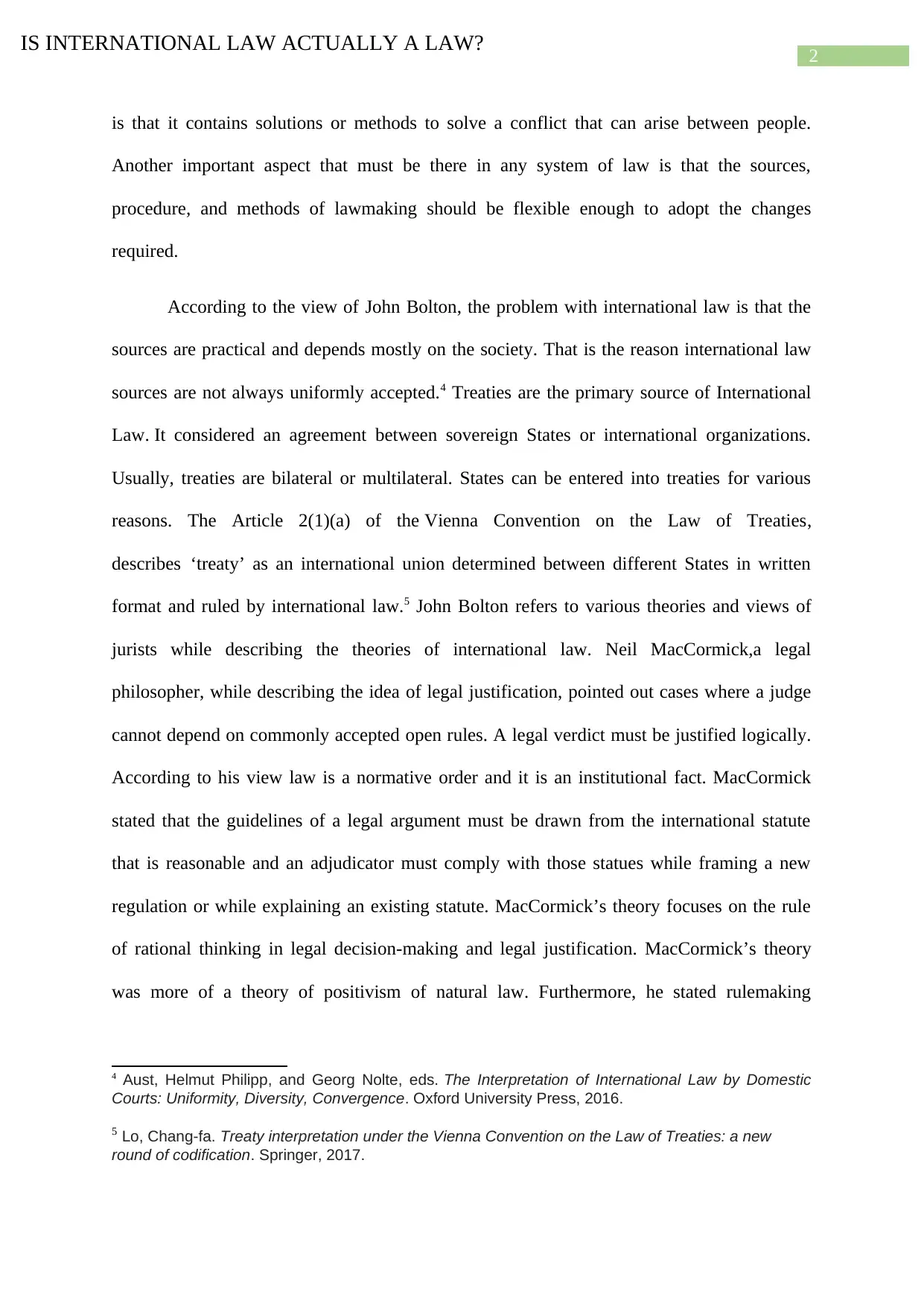
2
IS INTERNATIONAL LAW ACTUALLY A LAW?
is that it contains solutions or methods to solve a conflict that can arise between people.
Another important aspect that must be there in any system of law is that the sources,
procedure, and methods of lawmaking should be flexible enough to adopt the changes
required.
According to the view of John Bolton, the problem with international law is that the
sources are practical and depends mostly on the society. That is the reason international law
sources are not always uniformly accepted.4 Treaties are the primary source of International
Law. It considered an agreement between sovereign States or international organizations.
Usually, treaties are bilateral or multilateral. States can be entered into treaties for various
reasons. The Article 2(1)(a) of the Vienna Convention on the Law of Treaties,
describes ‘treaty’ as an international union determined between different States in written
format and ruled by international law.5 John Bolton refers to various theories and views of
jurists while describing the theories of international law. Neil MacCormick,a legal
philosopher, while describing the idea of legal justification, pointed out cases where a judge
cannot depend on commonly accepted open rules. A legal verdict must be justified logically.
According to his view law is a normative order and it is an institutional fact. MacCormick
stated that the guidelines of a legal argument must be drawn from the international statute
that is reasonable and an adjudicator must comply with those statues while framing a new
regulation or while explaining an existing statute. MacCormick’s theory focuses on the rule
of rational thinking in legal decision-making and legal justification. MacCormick’s theory
was more of a theory of positivism of natural law. Furthermore, he stated rulemaking
4 Aust, Helmut Philipp, and Georg Nolte, eds. The Interpretation of International Law by Domestic
Courts: Uniformity, Diversity, Convergence. Oxford University Press, 2016.
5 Lo, Chang-fa. Treaty interpretation under the Vienna Convention on the Law of Treaties: a new
round of codification. Springer, 2017.
IS INTERNATIONAL LAW ACTUALLY A LAW?
is that it contains solutions or methods to solve a conflict that can arise between people.
Another important aspect that must be there in any system of law is that the sources,
procedure, and methods of lawmaking should be flexible enough to adopt the changes
required.
According to the view of John Bolton, the problem with international law is that the
sources are practical and depends mostly on the society. That is the reason international law
sources are not always uniformly accepted.4 Treaties are the primary source of International
Law. It considered an agreement between sovereign States or international organizations.
Usually, treaties are bilateral or multilateral. States can be entered into treaties for various
reasons. The Article 2(1)(a) of the Vienna Convention on the Law of Treaties,
describes ‘treaty’ as an international union determined between different States in written
format and ruled by international law.5 John Bolton refers to various theories and views of
jurists while describing the theories of international law. Neil MacCormick,a legal
philosopher, while describing the idea of legal justification, pointed out cases where a judge
cannot depend on commonly accepted open rules. A legal verdict must be justified logically.
According to his view law is a normative order and it is an institutional fact. MacCormick
stated that the guidelines of a legal argument must be drawn from the international statute
that is reasonable and an adjudicator must comply with those statues while framing a new
regulation or while explaining an existing statute. MacCormick’s theory focuses on the rule
of rational thinking in legal decision-making and legal justification. MacCormick’s theory
was more of a theory of positivism of natural law. Furthermore, he stated rulemaking
4 Aust, Helmut Philipp, and Georg Nolte, eds. The Interpretation of International Law by Domestic
Courts: Uniformity, Diversity, Convergence. Oxford University Press, 2016.
5 Lo, Chang-fa. Treaty interpretation under the Vienna Convention on the Law of Treaties: a new
round of codification. Springer, 2017.
⊘ This is a preview!⊘
Do you want full access?
Subscribe today to unlock all pages.

Trusted by 1+ million students worldwide
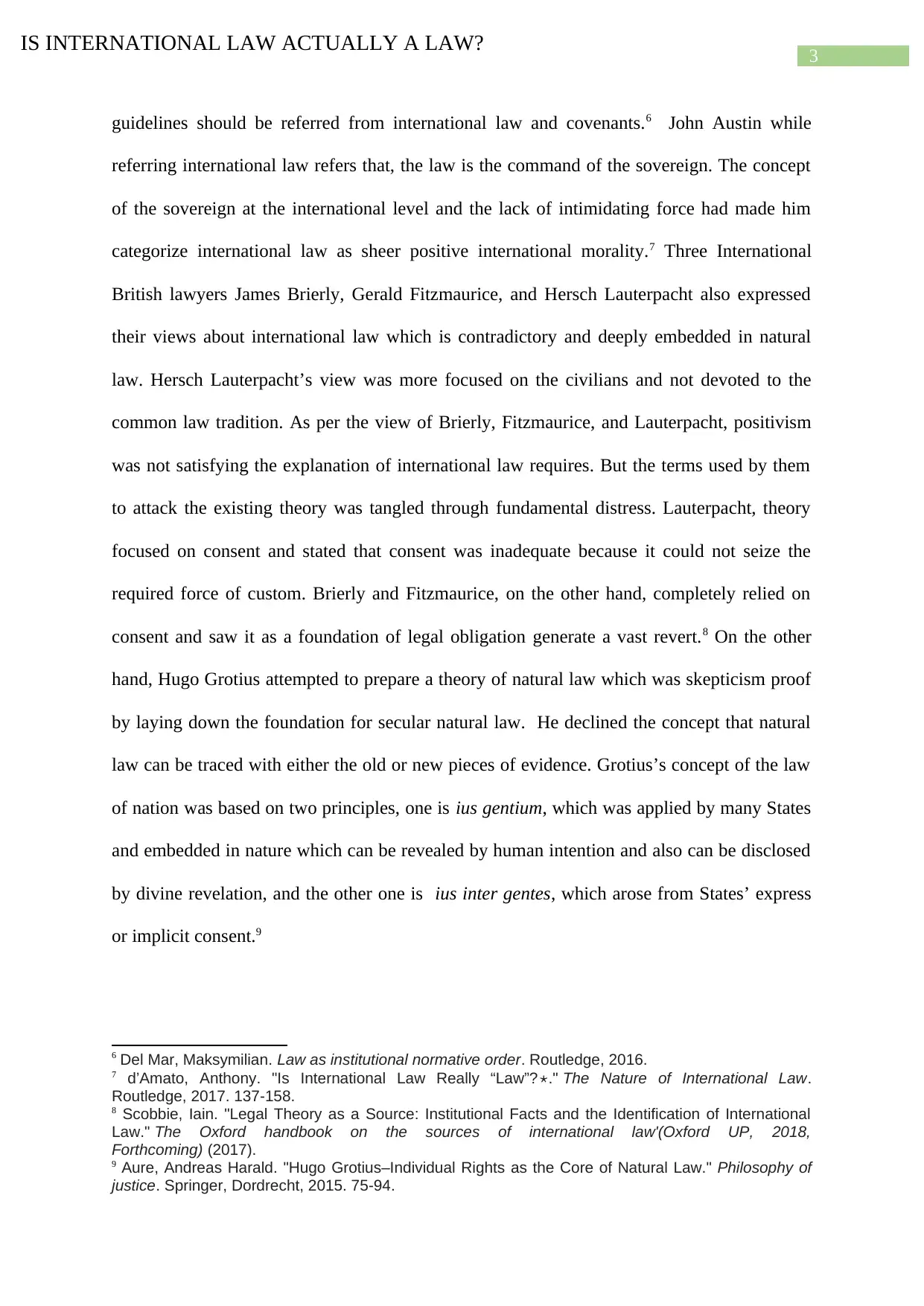
3
IS INTERNATIONAL LAW ACTUALLY A LAW?
guidelines should be referred from international law and covenants.6 John Austin while
referring international law refers that, the law is the command of the sovereign. The concept
of the sovereign at the international level and the lack of intimidating force had made him
categorize international law as sheer positive international morality.7 Three International
British lawyers James Brierly, Gerald Fitzmaurice, and Hersch Lauterpacht also expressed
their views about international law which is contradictory and deeply embedded in natural
law. Hersch Lauterpacht’s view was more focused on the civilians and not devoted to the
common law tradition. As per the view of Brierly, Fitzmaurice, and Lauterpacht, positivism
was not satisfying the explanation of international law requires. But the terms used by them
to attack the existing theory was tangled through fundamental distress. Lauterpacht, theory
focused on consent and stated that consent was inadequate because it could not seize the
required force of custom. Brierly and Fitzmaurice, on the other hand, completely relied on
consent and saw it as a foundation of legal obligation generate a vast revert.8 On the other
hand, Hugo Grotius attempted to prepare a theory of natural law which was skepticism proof
by laying down the foundation for secular natural law. He declined the concept that natural
law can be traced with either the old or new pieces of evidence. Grotius’s concept of the law
of nation was based on two principles, one is ius gentium, which was applied by many States
and embedded in nature which can be revealed by human intention and also can be disclosed
by divine revelation, and the other one is ius inter gentes, which arose from States’ express
or implicit consent.9
6 Del Mar, Maksymilian. Law as institutional normative order. Routledge, 2016.
7 d’Amato, Anthony. "Is International Law Really “Law”?⋆." The Nature of International Law.
Routledge, 2017. 137-158.
8 Scobbie, Iain. "Legal Theory as a Source: Institutional Facts and the Identification of International
Law." The Oxford handbook on the sources of international law'(Oxford UP, 2018,
Forthcoming) (2017).
9 Aure, Andreas Harald. "Hugo Grotius–Individual Rights as the Core of Natural Law." Philosophy of
justice. Springer, Dordrecht, 2015. 75-94.
IS INTERNATIONAL LAW ACTUALLY A LAW?
guidelines should be referred from international law and covenants.6 John Austin while
referring international law refers that, the law is the command of the sovereign. The concept
of the sovereign at the international level and the lack of intimidating force had made him
categorize international law as sheer positive international morality.7 Three International
British lawyers James Brierly, Gerald Fitzmaurice, and Hersch Lauterpacht also expressed
their views about international law which is contradictory and deeply embedded in natural
law. Hersch Lauterpacht’s view was more focused on the civilians and not devoted to the
common law tradition. As per the view of Brierly, Fitzmaurice, and Lauterpacht, positivism
was not satisfying the explanation of international law requires. But the terms used by them
to attack the existing theory was tangled through fundamental distress. Lauterpacht, theory
focused on consent and stated that consent was inadequate because it could not seize the
required force of custom. Brierly and Fitzmaurice, on the other hand, completely relied on
consent and saw it as a foundation of legal obligation generate a vast revert.8 On the other
hand, Hugo Grotius attempted to prepare a theory of natural law which was skepticism proof
by laying down the foundation for secular natural law. He declined the concept that natural
law can be traced with either the old or new pieces of evidence. Grotius’s concept of the law
of nation was based on two principles, one is ius gentium, which was applied by many States
and embedded in nature which can be revealed by human intention and also can be disclosed
by divine revelation, and the other one is ius inter gentes, which arose from States’ express
or implicit consent.9
6 Del Mar, Maksymilian. Law as institutional normative order. Routledge, 2016.
7 d’Amato, Anthony. "Is International Law Really “Law”?⋆." The Nature of International Law.
Routledge, 2017. 137-158.
8 Scobbie, Iain. "Legal Theory as a Source: Institutional Facts and the Identification of International
Law." The Oxford handbook on the sources of international law'(Oxford UP, 2018,
Forthcoming) (2017).
9 Aure, Andreas Harald. "Hugo Grotius–Individual Rights as the Core of Natural Law." Philosophy of
justice. Springer, Dordrecht, 2015. 75-94.
Paraphrase This Document
Need a fresh take? Get an instant paraphrase of this document with our AI Paraphraser
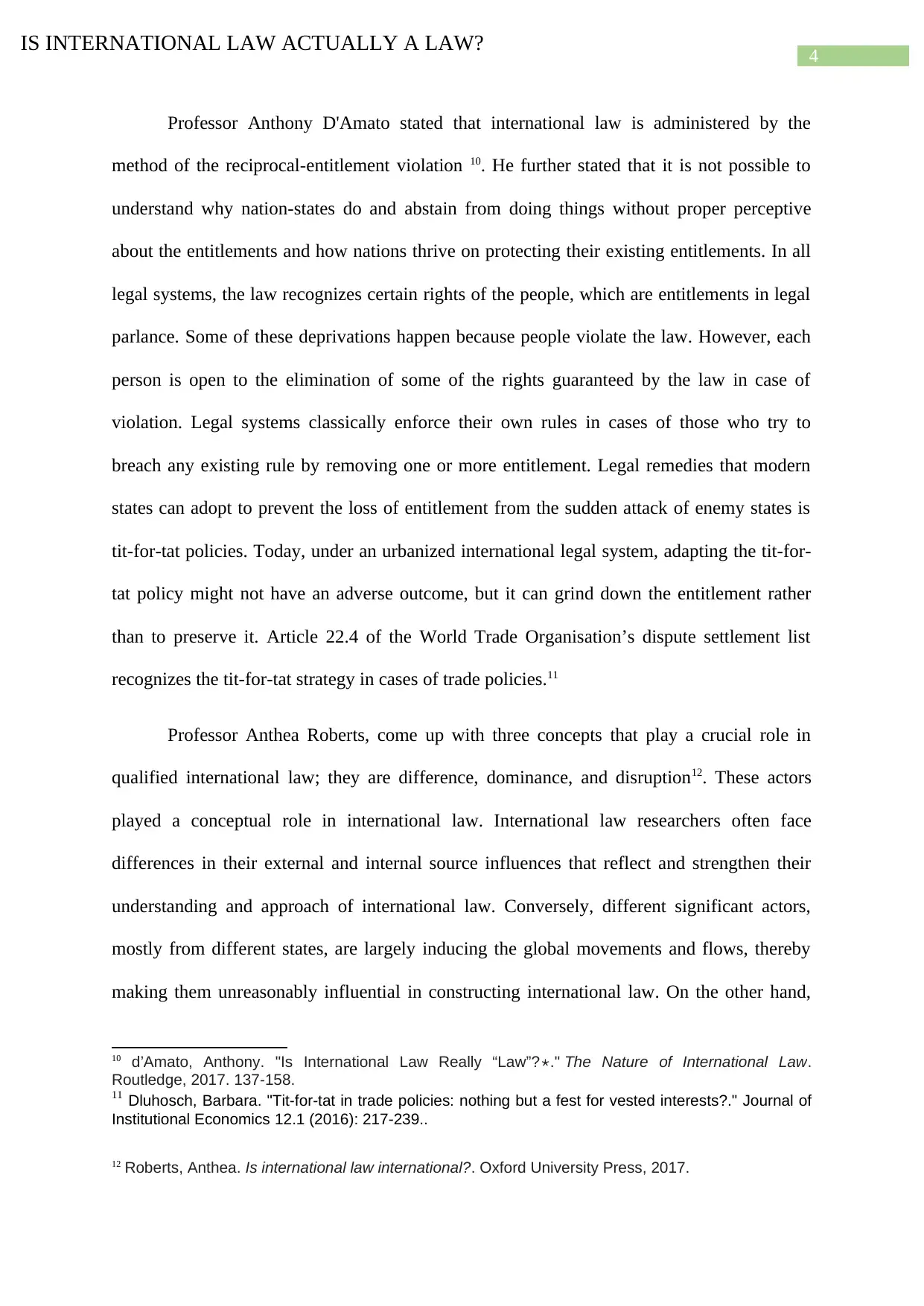
4
IS INTERNATIONAL LAW ACTUALLY A LAW?
Professor Anthony D'Amato stated that international law is administered by the
method of the reciprocal-entitlement violation 10. He further stated that it is not possible to
understand why nation-states do and abstain from doing things without proper perceptive
about the entitlements and how nations thrive on protecting their existing entitlements. In all
legal systems, the law recognizes certain rights of the people, which are entitlements in legal
parlance. Some of these deprivations happen because people violate the law. However, each
person is open to the elimination of some of the rights guaranteed by the law in case of
violation. Legal systems classically enforce their own rules in cases of those who try to
breach any existing rule by removing one or more entitlement. Legal remedies that modern
states can adopt to prevent the loss of entitlement from the sudden attack of enemy states is
tit-for-tat policies. Today, under an urbanized international legal system, adapting the tit-for-
tat policy might not have an adverse outcome, but it can grind down the entitlement rather
than to preserve it. Article 22.4 of the World Trade Organisation’s dispute settlement list
recognizes the tit-for-tat strategy in cases of trade policies.11
Professor Anthea Roberts, come up with three concepts that play a crucial role in
qualified international law; they are difference, dominance, and disruption12. These actors
played a conceptual role in international law. International law researchers often face
differences in their external and internal source influences that reflect and strengthen their
understanding and approach of international law. Conversely, different significant actors,
mostly from different states, are largely inducing the global movements and flows, thereby
making them unreasonably influential in constructing international law. On the other hand,
10 d’Amato, Anthony. "Is International Law Really “Law”?⋆." The Nature of International Law.
Routledge, 2017. 137-158.
11 Dluhosch, Barbara. "Tit-for-tat in trade policies: nothing but a fest for vested interests?." Journal of
Institutional Economics 12.1 (2016): 217-239..
12 Roberts, Anthea. Is international law international?. Oxford University Press, 2017.
IS INTERNATIONAL LAW ACTUALLY A LAW?
Professor Anthony D'Amato stated that international law is administered by the
method of the reciprocal-entitlement violation 10. He further stated that it is not possible to
understand why nation-states do and abstain from doing things without proper perceptive
about the entitlements and how nations thrive on protecting their existing entitlements. In all
legal systems, the law recognizes certain rights of the people, which are entitlements in legal
parlance. Some of these deprivations happen because people violate the law. However, each
person is open to the elimination of some of the rights guaranteed by the law in case of
violation. Legal systems classically enforce their own rules in cases of those who try to
breach any existing rule by removing one or more entitlement. Legal remedies that modern
states can adopt to prevent the loss of entitlement from the sudden attack of enemy states is
tit-for-tat policies. Today, under an urbanized international legal system, adapting the tit-for-
tat policy might not have an adverse outcome, but it can grind down the entitlement rather
than to preserve it. Article 22.4 of the World Trade Organisation’s dispute settlement list
recognizes the tit-for-tat strategy in cases of trade policies.11
Professor Anthea Roberts, come up with three concepts that play a crucial role in
qualified international law; they are difference, dominance, and disruption12. These actors
played a conceptual role in international law. International law researchers often face
differences in their external and internal source influences that reflect and strengthen their
understanding and approach of international law. Conversely, different significant actors,
mostly from different states, are largely inducing the global movements and flows, thereby
making them unreasonably influential in constructing international law. On the other hand,
10 d’Amato, Anthony. "Is International Law Really “Law”?⋆." The Nature of International Law.
Routledge, 2017. 137-158.
11 Dluhosch, Barbara. "Tit-for-tat in trade policies: nothing but a fest for vested interests?." Journal of
Institutional Economics 12.1 (2016): 217-239..
12 Roberts, Anthea. Is international law international?. Oxford University Press, 2017.
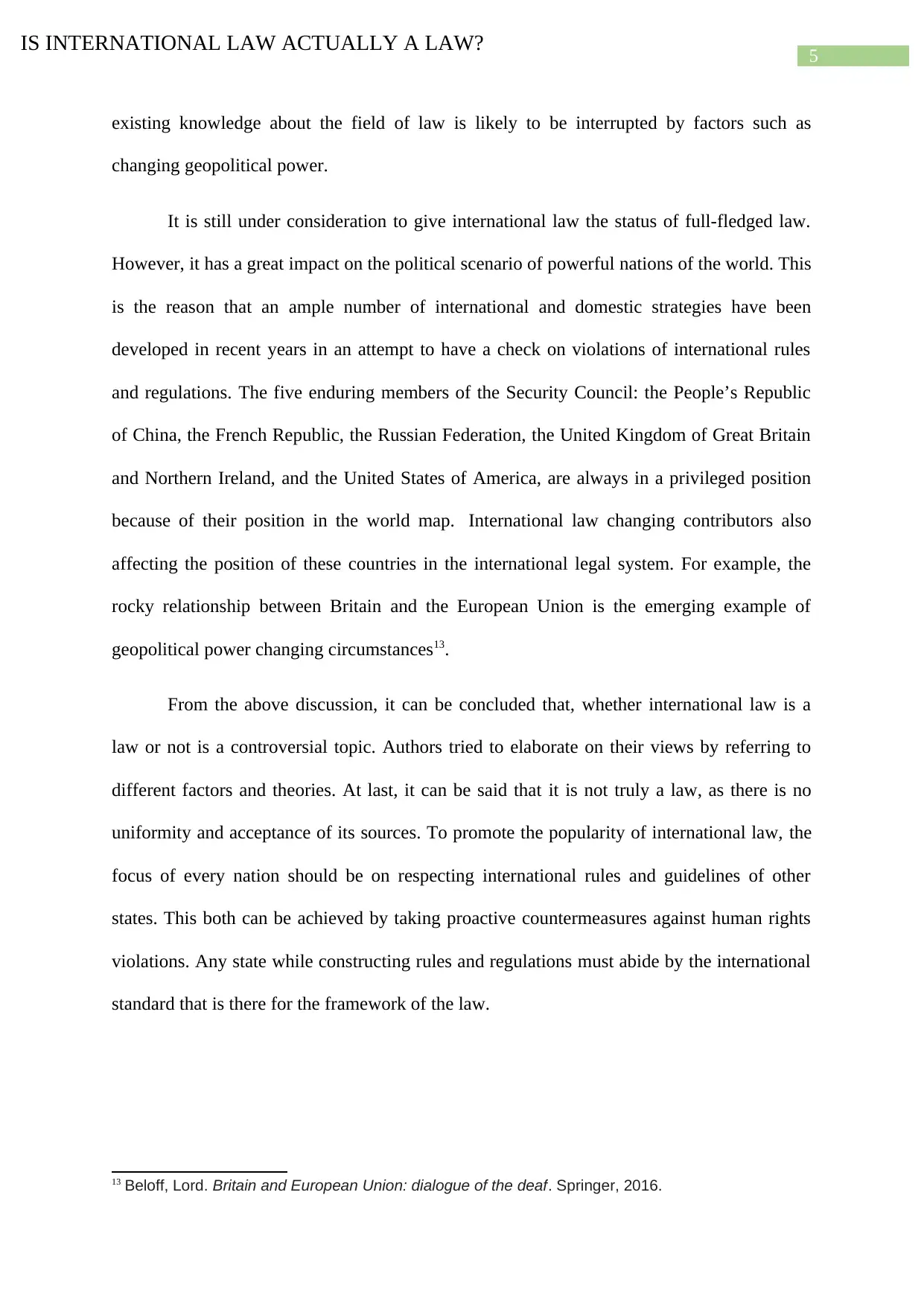
5
IS INTERNATIONAL LAW ACTUALLY A LAW?
existing knowledge about the field of law is likely to be interrupted by factors such as
changing geopolitical power.
It is still under consideration to give international law the status of full-fledged law.
However, it has a great impact on the political scenario of powerful nations of the world. This
is the reason that an ample number of international and domestic strategies have been
developed in recent years in an attempt to have a check on violations of international rules
and regulations. The five enduring members of the Security Council: the People’s Republic
of China, the French Republic, the Russian Federation, the United Kingdom of Great Britain
and Northern Ireland, and the United States of America, are always in a privileged position
because of their position in the world map. International law changing contributors also
affecting the position of these countries in the international legal system. For example, the
rocky relationship between Britain and the European Union is the emerging example of
geopolitical power changing circumstances13.
From the above discussion, it can be concluded that, whether international law is a
law or not is a controversial topic. Authors tried to elaborate on their views by referring to
different factors and theories. At last, it can be said that it is not truly a law, as there is no
uniformity and acceptance of its sources. To promote the popularity of international law, the
focus of every nation should be on respecting international rules and guidelines of other
states. This both can be achieved by taking proactive countermeasures against human rights
violations. Any state while constructing rules and regulations must abide by the international
standard that is there for the framework of the law.
13 Beloff, Lord. Britain and European Union: dialogue of the deaf. Springer, 2016.
IS INTERNATIONAL LAW ACTUALLY A LAW?
existing knowledge about the field of law is likely to be interrupted by factors such as
changing geopolitical power.
It is still under consideration to give international law the status of full-fledged law.
However, it has a great impact on the political scenario of powerful nations of the world. This
is the reason that an ample number of international and domestic strategies have been
developed in recent years in an attempt to have a check on violations of international rules
and regulations. The five enduring members of the Security Council: the People’s Republic
of China, the French Republic, the Russian Federation, the United Kingdom of Great Britain
and Northern Ireland, and the United States of America, are always in a privileged position
because of their position in the world map. International law changing contributors also
affecting the position of these countries in the international legal system. For example, the
rocky relationship between Britain and the European Union is the emerging example of
geopolitical power changing circumstances13.
From the above discussion, it can be concluded that, whether international law is a
law or not is a controversial topic. Authors tried to elaborate on their views by referring to
different factors and theories. At last, it can be said that it is not truly a law, as there is no
uniformity and acceptance of its sources. To promote the popularity of international law, the
focus of every nation should be on respecting international rules and guidelines of other
states. This both can be achieved by taking proactive countermeasures against human rights
violations. Any state while constructing rules and regulations must abide by the international
standard that is there for the framework of the law.
13 Beloff, Lord. Britain and European Union: dialogue of the deaf. Springer, 2016.
⊘ This is a preview!⊘
Do you want full access?
Subscribe today to unlock all pages.

Trusted by 1+ million students worldwide
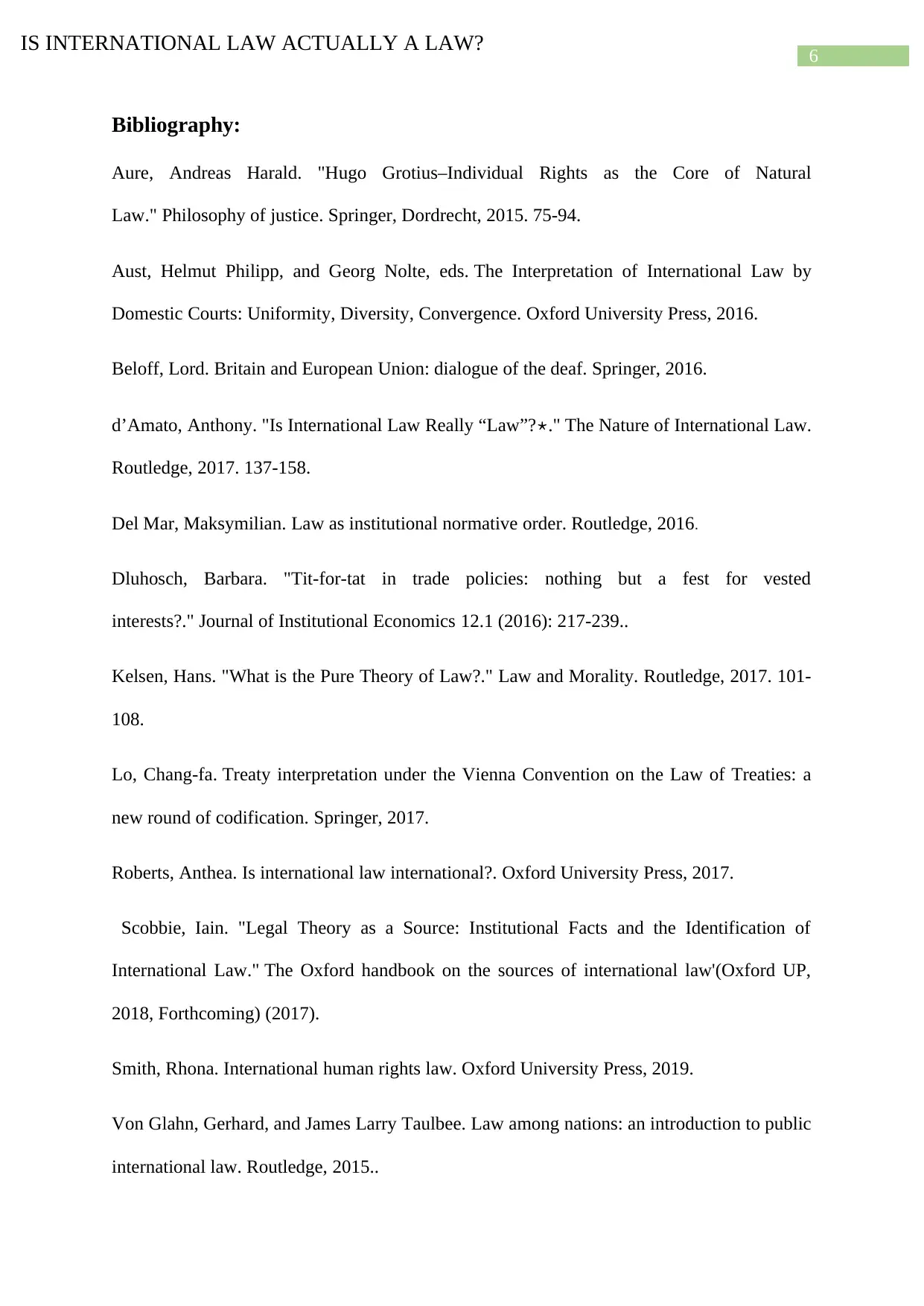
6
IS INTERNATIONAL LAW ACTUALLY A LAW?
Bibliography:
Aure, Andreas Harald. "Hugo Grotius–Individual Rights as the Core of Natural
Law." Philosophy of justice. Springer, Dordrecht, 2015. 75-94.
Aust, Helmut Philipp, and Georg Nolte, eds. The Interpretation of International Law by
Domestic Courts: Uniformity, Diversity, Convergence. Oxford University Press, 2016.
Beloff, Lord. Britain and European Union: dialogue of the deaf. Springer, 2016.
d’Amato, Anthony. "Is International Law Really “Law”?⋆." The Nature of International Law.
Routledge, 2017. 137-158.
Del Mar, Maksymilian. Law as institutional normative order. Routledge, 2016.
Dluhosch, Barbara. "Tit-for-tat in trade policies: nothing but a fest for vested
interests?." Journal of Institutional Economics 12.1 (2016): 217-239..
Kelsen, Hans. "What is the Pure Theory of Law?." Law and Morality. Routledge, 2017. 101-
108.
Lo, Chang-fa. Treaty interpretation under the Vienna Convention on the Law of Treaties: a
new round of codification. Springer, 2017.
Roberts, Anthea. Is international law international?. Oxford University Press, 2017.
Scobbie, Iain. "Legal Theory as a Source: Institutional Facts and the Identification of
International Law." The Oxford handbook on the sources of international law'(Oxford UP,
2018, Forthcoming) (2017).
Smith, Rhona. International human rights law. Oxford University Press, 2019.
Von Glahn, Gerhard, and James Larry Taulbee. Law among nations: an introduction to public
international law. Routledge, 2015..
IS INTERNATIONAL LAW ACTUALLY A LAW?
Bibliography:
Aure, Andreas Harald. "Hugo Grotius–Individual Rights as the Core of Natural
Law." Philosophy of justice. Springer, Dordrecht, 2015. 75-94.
Aust, Helmut Philipp, and Georg Nolte, eds. The Interpretation of International Law by
Domestic Courts: Uniformity, Diversity, Convergence. Oxford University Press, 2016.
Beloff, Lord. Britain and European Union: dialogue of the deaf. Springer, 2016.
d’Amato, Anthony. "Is International Law Really “Law”?⋆." The Nature of International Law.
Routledge, 2017. 137-158.
Del Mar, Maksymilian. Law as institutional normative order. Routledge, 2016.
Dluhosch, Barbara. "Tit-for-tat in trade policies: nothing but a fest for vested
interests?." Journal of Institutional Economics 12.1 (2016): 217-239..
Kelsen, Hans. "What is the Pure Theory of Law?." Law and Morality. Routledge, 2017. 101-
108.
Lo, Chang-fa. Treaty interpretation under the Vienna Convention on the Law of Treaties: a
new round of codification. Springer, 2017.
Roberts, Anthea. Is international law international?. Oxford University Press, 2017.
Scobbie, Iain. "Legal Theory as a Source: Institutional Facts and the Identification of
International Law." The Oxford handbook on the sources of international law'(Oxford UP,
2018, Forthcoming) (2017).
Smith, Rhona. International human rights law. Oxford University Press, 2019.
Von Glahn, Gerhard, and James Larry Taulbee. Law among nations: an introduction to public
international law. Routledge, 2015..
Paraphrase This Document
Need a fresh take? Get an instant paraphrase of this document with our AI Paraphraser
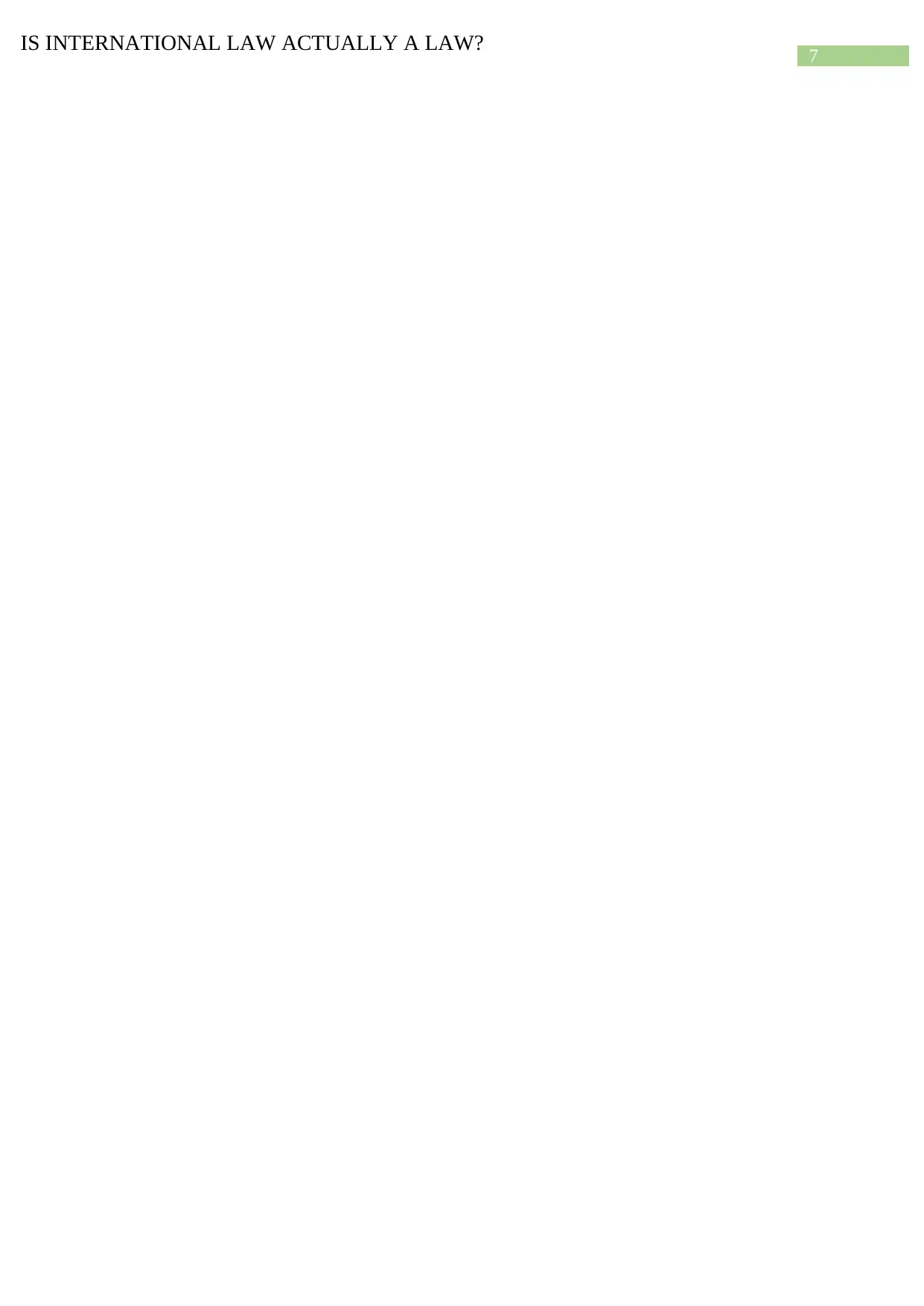
7
IS INTERNATIONAL LAW ACTUALLY A LAW?
IS INTERNATIONAL LAW ACTUALLY A LAW?
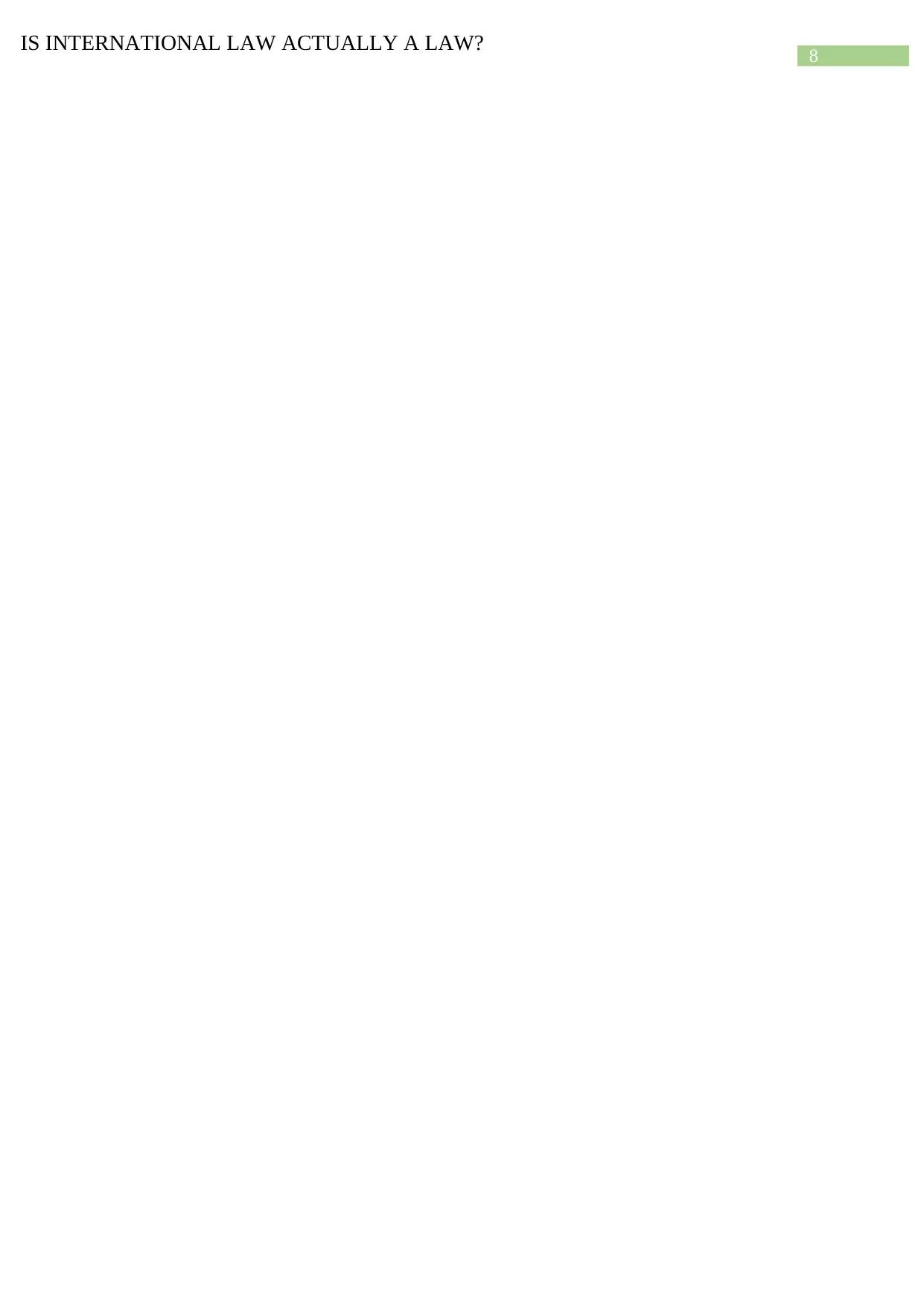
8
IS INTERNATIONAL LAW ACTUALLY A LAW?
IS INTERNATIONAL LAW ACTUALLY A LAW?
⊘ This is a preview!⊘
Do you want full access?
Subscribe today to unlock all pages.

Trusted by 1+ million students worldwide
1 out of 9
Related Documents
Your All-in-One AI-Powered Toolkit for Academic Success.
+13062052269
info@desklib.com
Available 24*7 on WhatsApp / Email
![[object Object]](/_next/static/media/star-bottom.7253800d.svg)
Unlock your academic potential
Copyright © 2020–2026 A2Z Services. All Rights Reserved. Developed and managed by ZUCOL.





